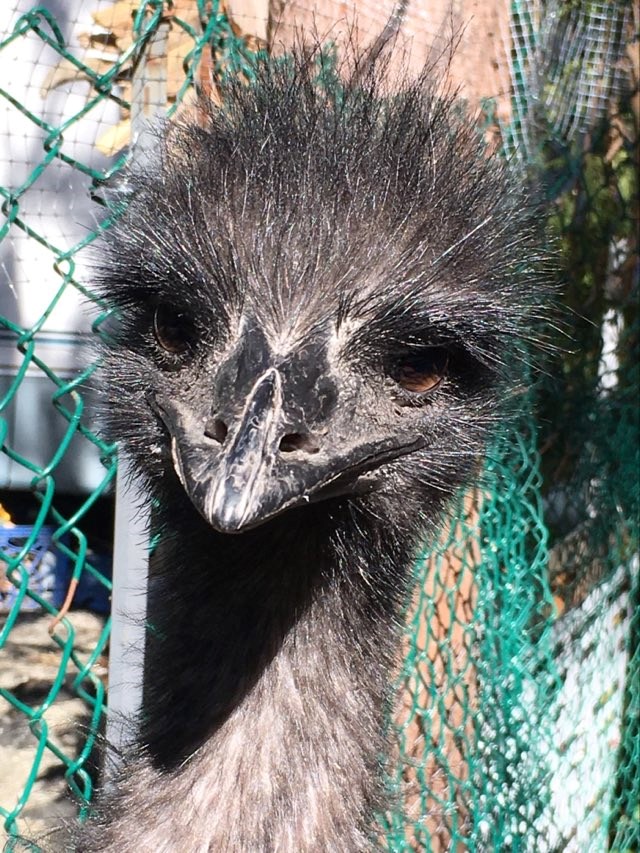Two huskies are now officially “vicious dogs” in the eyes of the Sunshine Coast Regional District’s (SCRD) bylaw enforcement division, after an attack caused the death of a family pet emu in Halfmoon Bay.
Earlier this month, outrage was sparked when two dogs breached an enclosure on private property where Big Bird, an eight-month-old emu, lived. The dogs attacked the flightless bird on May 1. By the next morning, she was dead.
The dogs were held by the SCRD for 72 hours before being turned over to the SPCA. After an investigation, the SCRD has confirmed the bylaw enforcement division issued six tickets regarding the dogs: four “dog at large” tickets and one for each dog without a dog licence. All six of the $90 tickets were paid, communications person Aidan Buckley said.
The bylaw department also issued “vicious dog” letters to the owners. That designation comes with an increased cost for further infractions. Impound fines range on an increasing scale from $250 to $1,500 plus board for each time a vicious dog is impounded.
Since 2005, approximately 67 dogs have been designated as vicious dogs in the SCRD. There is no information available as to how many of those dogs are still alive or continue to reside in the regional district.
Dawn Dickeson, whose family owned Big Bird, said she considers the outcome “a legal resolution” to the incident. “It puts all the onus on the owners,” she said of the dogs’ new designation.
Since the incident was on a Sunday, Dickeson said their experience has raised concerns about who to call in the case of an emergency. Ultimately, it was volunteers who responded and helped the Dickesons try to save their beloved pet, and other services were able to respond the next day.
“It really hit a nerve in the community,” Dickeson said of the outcry on social media following the attack. “People were really upset.”
Now, Dickeson asks anyone who sees the dogs running at large or acting in a dangerous manner to take photos and report it to the SCRD’s bylaw department (604-885-6817 or by filling out the Bylaw Complaint Form at www.scrd.ca) — and call 911 if need be. For attacks involving wildlife, the Conservation Officer Service can be called at 1-877-952-7277.
Of Big Bird, Dickeson said “An animal like that is so quirky and has so such a character, that it leaves such a lasting impact… I don't get animals any more because I can't stand to lose them.”
What does the bylaw say?
“Run at large” is a term used when a dog is outside its owner’s or caretaker’s property and not under the immediate control of a responsible and competent person. When a dog is deemed to be vicious by the regional district, it can be “at large” even while on its owner’s property, if “said dog is not being contained in a dwelling house or an enclosed pen or other structure capable of preventing the entry of young children and adequately constructed to prevent the vicious dog from escaping.”
So what is a vicious dog? The Dog Regulation and Impounding Bylaw No. 376 says a “vicious dog” is “any dog with a known propensity, tendency or disposition to attack without provocation other domestic animals or humans” or “any dog which has bitten or killed another domestic animal or human without provocation” or “a dog which attacks or aggressively pursues a person or domestic animal.” The definition in the SCRD’s bylaw also includes several breeds: a Pit Bull Terrier, American Pit Bull Terrier, Pit Bull, Staffordshire Bull Terrier, American Staffordshire Terrier or any dog whose breeding includes those breeds.
Owners of a “vicious dog” cannot let the animal be on any highway or area (not owned by the owner) unless that dog is “effectively muzzled to prevent it from biting another animal or a human. Owners also have to inform the dog control officer if they move to a new address with the dog within a week of the change of address, according to the regulations.
If a vicious dog causes an injury to a person or domestic animal, the dog control officer can detain the dog until a hearing about whether the dog will be “humanely destroyed.”
“One of the best things people can do is to report incidents when they occur. Waiting until there have been multiple incidents to report issues can be detrimental to an investigation outcome,” SCRD senior bylaw officer Krissy Kirkpatrick previously told Coast Reporter. “Reporting issues when they occur can prevent future incidents as well as establish a historical file on a dog should things escalate to a point where more action needs to be taken by an officer.”



